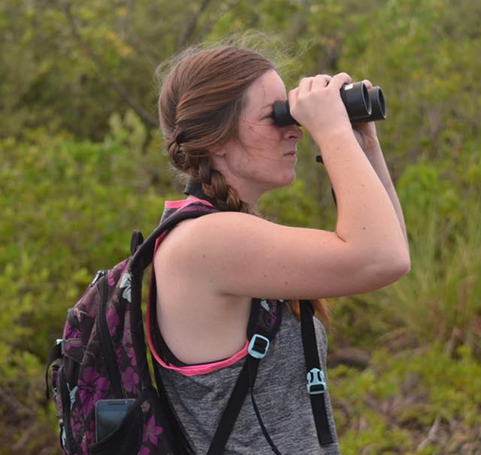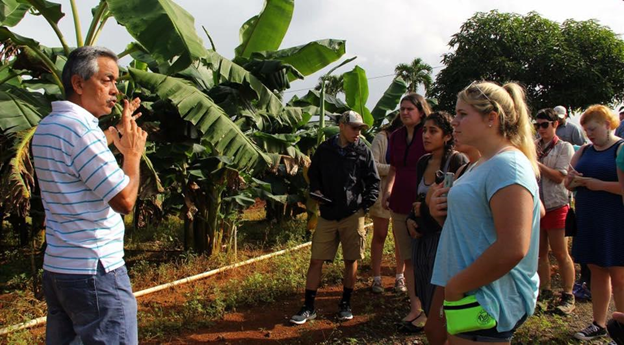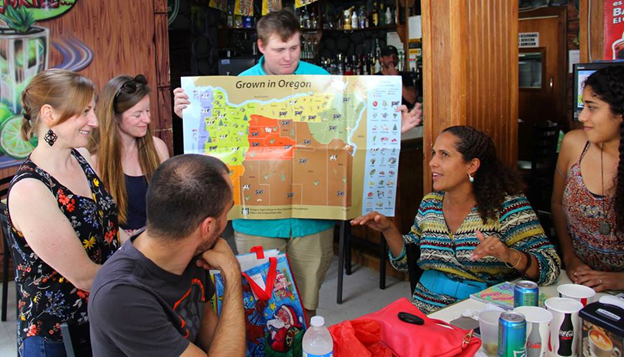The College of Agricultural Sciences at Oregon State University is Oregon's principal source of knowledge relating to agricultural and food systems, and a major source of knowledge regarding environmental quality, natural resources, life sciences, and rural economies and communities worldwide. The College provides undergraduate and graduate education leading to baccalaureate and graduate degrees, and extended education programs throughout Oregon and beyond. Its research programs create knowledge to solve problems and to build a knowledge base for the future. It is a source of information and expertise in integrating and applying knowledge with benefits that are felt in domestic and international settings.
Written by Auna Godinez and Katie Gaebel
Originally designed as an agriculture tour focused on food security and sustainability on a tropical island, the December trip encompassed service-learning projects for the students who attended. All 11 students assisted in planning, translating, and delivering three different agriculture-based lesson plans. Since much of the funding in Puerto Rico for agriculture programming has been cut in recent years, the lesson plans and ready-made agriculture lesson kits gave Oregon State students a creative and high-impact way to provide long-term change in the two Puerto Rican schools the group visited. In addition to educational service learning, Oregon State students identified and recorded bird species on a citizen-science bird survey project sponsored by Para la Naturaleza, a non-profit environmental organization in Puerto Rico.
Students were able to explore many different aspects within agriculture, including rare places like the colorful coral reefs from Culebra Island, where the group went swimming with sea turtles, kayaking through a tranquil ocean current, and snorkeling amongst diverse tropical fish in the reefs. Another highlight was staying within the boundaries of El Yunque National Forest at a lovely ecolodge nestled in the mountains full of lush vegetation, breathtaking waterfalls, and miles of trails. The group visited the Corozol Experiment Station where they learned about different banana varieties, the diseases that currently affect the crops, and what Puerto Rican farmers and researchers are doing to try to resolve these issues. Last, but not least, it was truly an amazing opportunity to visit a local elementary school to teach them about Oregon agriculture, see their own agriculture program, and to hear what the children had to say about agriculture. They have their own crops growing on a picturesque piece of land they are putting to good use and learning so much from. Their excitement about agriculture and abundance of knowledge brought hope to our hearts that these next generations will create a strong and successful future of agriculture on the island of Puerto Rico.
This trip allowed many students the opportunity to explore interests within agriculture by touring different types of crops within a tropical environment not found in Oregon. It helped students discover which areas of agriculture and natural resources they like and want to focus on. The hands-on interaction with plants, animals, and research will help students when they continue in their agricultural coursework. This short-term trip also allowed agriculture education students to practice leading a lesson to get a feel for what the real world may be like. It was extremely impactful to learn about the culture, environment, and politics of the island that has led some of us to pursue careers that allow us to work within Puerto Rico.
A group of 20 agriculture majors and faculty from the University of Puerto Rico will be visiting Oregon State in early April to get a feel for Oregon agriculture and agricultural education. Among the planned activities include visits to numerous FFA programs, a local winery, and a country-western dance hosted by the College of Agricultural Sciences Country Western Dance Club. If you’re interested in having the Puerto Rican group tour your farm, school, or organization, reach out to Katie Gaebel.
Kelly Shotwell participating in the Christmas Bird Count survey with Para la Naturaleza
Oregon State University group, with Dr. Edly Santiago and her family, in Old San Juan
Learning about banana plant diseases at the Corozal Experiment Station
Explaining Oregon commodities to Dr. Edly Santiago of the University of Puerto Rico






